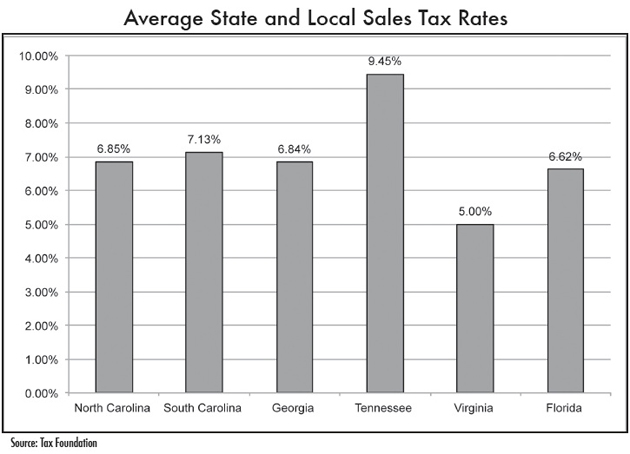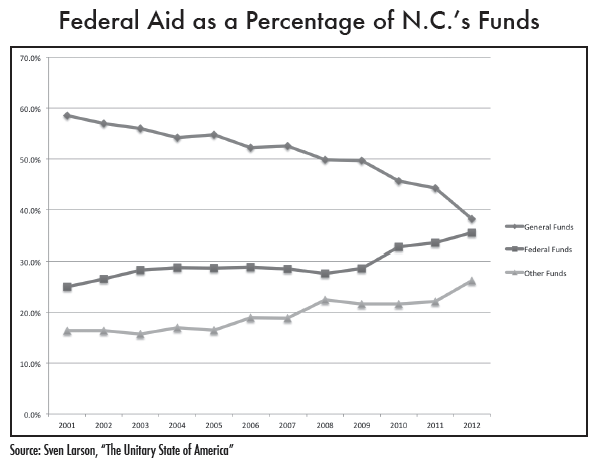A Constitutional Republic, where the First Amendment is Essential to OUR Survival
Agenda 2012: Federal Aid Dependency
Publisher's note: Agenda 2012 is the John Locke Foundation's charge to make known their wise political agenda to voters, and most especially candidates, with our seventh installment being the "State Spending Restraint," written by Fergus Hodgson, Director of Fiscal Policy Studies,
John Locke Foundation. The first installment was the "Introduction" published here.
Since the onset of the Great Recession, federal legislators have rapidly expanded debt-financed aid-to-state programs. North Carolina is no exception to the trend of states with greater dependence, and federal aid is now roughly equal to general funds as a source of state revenue. (Two states, Louisiana and Oklahoma, now receive a majority of their revenues through federal aid.)
Federal aid erodes state sovereignty since federal officials often use the threat of reduced aid to dictate state policy. But it has two other, less obvious effects which merit attention since they tend towards long-run fiscal shortfalls.
First, when federal officials are borrowing money -- or generating it anew through the Federal Reserve System -- they are not subject to a balanced budget constraint. If they send that borrowed money to state officials, they allow them to bypass their own state-level balanced budget constraints and achieve deficit financing against the will of constituents.
Second, many federal grants have sunset clauses, but once created the recipients remain even after the money runs out. That means state officials face political pressure to perpetuate what were originally federally funded programs. The recent dispute over how to maintain and fund the number of taxpayer-funded teachers in North Carolina after federal "stimulus" funding ran out is one such example.
Key Facts
• After declining in 2006 and 2007, the flow of federal aid to state and local governments has grown in every year since -- including by 15 and 12 percent in 2009 and 2010 respectively.
• In this fiscal year of 2012, federal aid comprises 36 percent of North Carolina's revenues, up from 25 percent in 2000 and 21 percent in 1975. Federal aid for every North Carolina resident is $1,865.
• 30 percent of that federal aid in 2012 was debt financed. As a portion of the $18.3 billion that North Carolina received, it equates to a deficit of $5.4 billion, or more than 10 percent of total state spending.
• Each dollar of temporary federal aid tends to raise taxes by 40 cents after cessation of the funding -- as estimated by the Mercatus Center at George Mason University.
Recommendations
1. Support a resolution for a state initiated amendments convention for a fiscal constraint on the federal government. Forty-nine states have some form of balanced budget and a majority of United States residents support an amendment against further federal deficits. The National Debt Relief Amendment, endorsed by the American Legislative Exchange Council and passed in North Dakota and Louisiana, is one simple solution of this sort.
2. Avoid all federal aid that brings requirements more onerous than the benefits. Keep in mind that the requirements include both those stated explicitly in the grant legislation and the political pressure to perpetuate a program once federal officials discontinue the aid.
3. Align with federal officials who support initiatives to restrain federal deficits and discontinue federal aid as a normal course of policy.


Analyst: Fergus Hodgson
Director of Fiscal Policy Studies
(919)828-3876 • fhodgson@johnlocke.org
Go Back
Since the onset of the Great Recession, federal legislators have rapidly expanded debt-financed aid-to-state programs. North Carolina is no exception to the trend of states with greater dependence, and federal aid is now roughly equal to general funds as a source of state revenue. (Two states, Louisiana and Oklahoma, now receive a majority of their revenues through federal aid.)
Federal aid erodes state sovereignty since federal officials often use the threat of reduced aid to dictate state policy. But it has two other, less obvious effects which merit attention since they tend towards long-run fiscal shortfalls.
First, when federal officials are borrowing money -- or generating it anew through the Federal Reserve System -- they are not subject to a balanced budget constraint. If they send that borrowed money to state officials, they allow them to bypass their own state-level balanced budget constraints and achieve deficit financing against the will of constituents.
Second, many federal grants have sunset clauses, but once created the recipients remain even after the money runs out. That means state officials face political pressure to perpetuate what were originally federally funded programs. The recent dispute over how to maintain and fund the number of taxpayer-funded teachers in North Carolina after federal "stimulus" funding ran out is one such example.
Key Facts
• After declining in 2006 and 2007, the flow of federal aid to state and local governments has grown in every year since -- including by 15 and 12 percent in 2009 and 2010 respectively.
• In this fiscal year of 2012, federal aid comprises 36 percent of North Carolina's revenues, up from 25 percent in 2000 and 21 percent in 1975. Federal aid for every North Carolina resident is $1,865.
• 30 percent of that federal aid in 2012 was debt financed. As a portion of the $18.3 billion that North Carolina received, it equates to a deficit of $5.4 billion, or more than 10 percent of total state spending.
• Each dollar of temporary federal aid tends to raise taxes by 40 cents after cessation of the funding -- as estimated by the Mercatus Center at George Mason University.
Recommendations
1. Support a resolution for a state initiated amendments convention for a fiscal constraint on the federal government. Forty-nine states have some form of balanced budget and a majority of United States residents support an amendment against further federal deficits. The National Debt Relief Amendment, endorsed by the American Legislative Exchange Council and passed in North Dakota and Louisiana, is one simple solution of this sort.
2. Avoid all federal aid that brings requirements more onerous than the benefits. Keep in mind that the requirements include both those stated explicitly in the grant legislation and the political pressure to perpetuate a program once federal officials discontinue the aid.
3. Align with federal officials who support initiatives to restrain federal deficits and discontinue federal aid as a normal course of policy.


Analyst: Fergus Hodgson
Director of Fiscal Policy Studies
(919)828-3876 • fhodgson@johnlocke.org
Latest Bloodless Warfare: Politics
|
Only two of the so-called “three Johns” will be competing to replace Sen. Mitch McConnell (R-KY) as leader of the Senate GOP.
Published: Monday, April 15th, 2024 @ 12:50 pm
By: Daily Wire
|
|
Daily Wire Editor Emeritus Ben Shapiro, along with hosts Matt Walsh, Andrew Klavan, and company co-founder Jeremy Boreing discussed the state of the 2024 presidential election before President Joe Biden gave his State of the Union address on Thursday.
Published: Thursday, April 11th, 2024 @ 6:27 pm
By: Daily Wire
|
|
Former U.N. Ambassador Nikki Haley said this week that the criminal trials against former President Donald Trump should happen before the upcoming elections.
Published: Wednesday, April 10th, 2024 @ 1:38 pm
By: Daily Wire
|
|
It’s “Bo time” again, this time in North Carolina’s Sixth Congressional District.
Published: Sunday, April 7th, 2024 @ 7:50 pm
By: Carolina Journal
|
|
Robert F. Kennedy Jr. announced on Tuesday that he has selected Nicole Shanahan to be his vice presidential running mate as he continues to run as an Independent after dropping out of the Democratic Party’s presidential primary late last year.
Published: Sunday, April 7th, 2024 @ 8:24 am
By: Daily Wire
|
|
On Tuesday, another Republican announced that he plans to retire early from the House, a decision that would further diminish a narrow GOP majority in the lower chamber.
Published: Tuesday, April 2nd, 2024 @ 11:50 pm
By: Daily Wire
|
|
Sen. Bernie Sanders (I-VT) introduced a bill Wednesday that would shave 8 hours off the standard 40-hour work week that has been around for several decades.
Published: Friday, March 29th, 2024 @ 10:46 pm
By: Daily Wire
|
|
Glenn Beck: 'When the United States government can come after individuals, that's when you know our republic is crumbling.'
Published: Tuesday, March 26th, 2024 @ 11:43 pm
By: Daily Wire
|
|
Washington, D.C. — Congressman Greg Murphy, M.D. issued the following statement on the latest continuing resolution:
Published: Tuesday, March 26th, 2024 @ 4:38 pm
By: Eastern NC NOW Staff
|






















